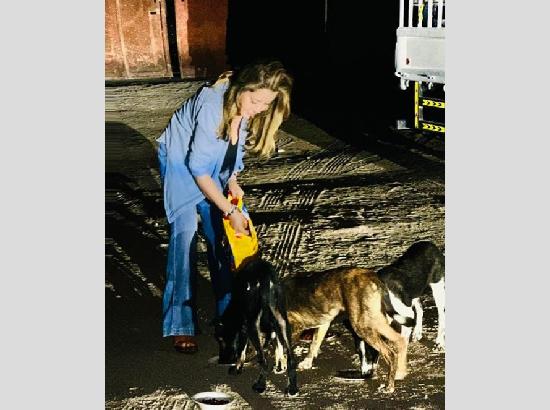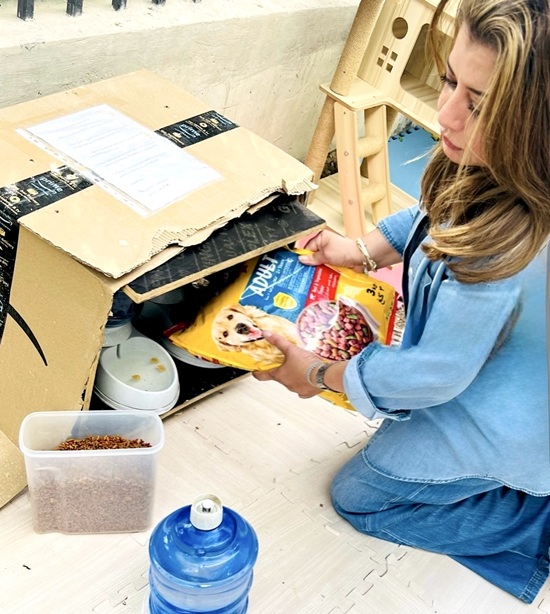Worshipped in temples, hunted on streets, the double life of street dogs......by Chiku Singh, Dubai, UAE
In Kerala, the Parassini Madappura Sree Muthappan Temple worships dogs as sacred beings, feeding them first during temple rituals, a sign of respect that sadly stands in clear contrast to the fate of Delhi’s stray dogs. Similarly, in Karnataka, the Channapatna Dog Temple, established in 2010, honours two dogs believed to protect the village, showing the strong bond between humans and dogs.

India worships animal gods at home Hanuman the monkey, Nandi the bull, Ganesha the elephant, Garuda the eagle, Matsya the fish, Surabhi the cow, Kamadhenu the wish-giving cow, and dogs too, who appear in mythology as Yama’s four-eyed guards, Bhairava’s loyal companion and the four dogs of Dattatreya symbolising the Vedas. Festivals like Kukur Tihar even honour dogs as protectors.
Notably, Lord Krishna himself had pet dogs Vyaghra and Bhramaraka, highlighting the deep cultural and spiritual bond between humans and dogs. Tragically, on the streets of Delhi, these same animals are being rounded up and removed, their suffering hidden under bureaucracy.
I have been rescuing animals for more than 30 years and I have seen extreme cruelty. Puppies abandoned in garbage bins, newborns left to suffocate in plastic bags, dogs burned with acid for entering a colony, mothers beaten while nursing, or locked in tiny cages without food or water.
Rape, deliberate breaking of limbs and one mother whose belly was slit open are among the repeated acts of brutality I have witnessed. These are not isolated incidents they are everyday horrors that reveal a deep moral failure.
We share this planet with animals. Coexistence is not optional, but it is a moral responsibility. Stray dogs are often blamed for bites or rabies. I understand these incidents are serious and have compassion for those affected.

However, they often occur because stray dogs are unsterilised, unvaccinated and neglected. The real solution lies in proper care, mass sterilisation and vaccination of dogs. People should also be encouraged to get rabies vaccinations and take preventive measures, ensuring the safety of both humans and animals. Addressing the root cause prevents bites and disease, instead of punishing innocent animals for systemic failures.
By law, the Animal Birth Control program requires that stray dogs are sterilised and vaccinated. However, in Delhi, the program faces serious challenges due to inefficiency, corruption, lack of supervision and limited resources.
Money set aside for sterilisation rarely reaches the ground. Outsourced programs often lack proper management. There are not enough shelters or mobile teams. As a result, dogs remain unsterilised, unvaccinated and unmanaged, while people blame the animals instead of the system responsible for their care.
Delhi has up to one million stray dogs. Removing them is not a solution. Stray dogs are an important part of the urban ecosystem. They help maintain balance by keeping populations of smaller animals like rodents under control and these guardians alert communities to potential dangers.
Without proper care, removing them simply shifts the problem, waste and pests can accumulate, increasing health risks for people. Stray dogs do what they must to survive, often eating from garbage and that is part of the reality of life in the city. Removing them does not clean the streets. It swaps wagging tails for twitching whiskers and the public ultimately bears the consequences in filth, fear and disease.
Authorities have announced plans to catch stray dogs and relocate them to so-called shelters. In reality, there are no functional shelters to accommodate even a fraction of Delhi’s up to one million stray dogs.
On August 11, 2025, the Supreme Court of India issued a directive mandating the removal of all stray dogs from public spaces in Delhi within eight weeks, requiring their relocation to shelters and prohibiting their return to the streets. It is simply impossible to build adequate shelters in such a short time.
Dogs will face severe hardship in remote areas, including starvation, dehydration and territorial fights that can result in serious injuries or death. This is effectively a culling disguised as relocation, leaving countless animals to suffer.

Much of the real work for Delhi’s dogs is carried by NGOs and volunteer rescuers and feeders. Many spend nearly all their own money to feed, vaccinate, sterilise and rescue stray dogs. These efforts show what is possible when compassion leads the way. Even with all the work volunteers do, the stray dogs still need a proper system to take care of them.
Other cities have already shown that humane programs work. Chennai reduced rabies deaths from 120 a year to zero with vaccination campaigns. Lucknow and Vadodara sterilised over 80 percent of their dog populations. Jaipur and Goa dramatically cut stray numbers and bite incidents. Even Mumbai, which once struggled with uncontrolled stray dog populations, saw success when it invested in sterilisation and vaccination campaigns.
Stray dogs also bring unseen value. They act as guardians of our streets, helping keep neighbourhoods safer and balanced. They offer companionship to those who cannot afford pets, inspire community engagement in neighbourhoods and remind us of our cultural duty to show compassion. They are not just survivors. They are part of our shared history and future.
India has the resources to do what is right. The solution is clear, mass sterilisation, mass vaccination, shutting down illegal breeders and pet shops and promoting adoption from shelters and the streets. Sterilised dogs are calmer, less aggressive and roam less.
Vaccinated dogs protect human health. Humane programs are the only proven way to reduce conflict. Removing or culling dogs from the streets without proper care is not just unsustainable. It is a moral failure. This not only endangers animals but also damages India’s global reputation. Delhi already has a reputation for safety concerns and making the city unfriendly to animals could further harm its image and sustainable tourism.
As Gandhi said, the greatness of a nation is measured by how it treats its animals. The suffering of Delhi’s stray dogs is a mirror to our values. How we respond will define the conscience of our nation.
August 20, 2025
https://www.instagram.com/chiku_animalrights?igsh=MWpnZnQ5NWw4emJvNw==
-

-
Chiku Singh, Writer, Animal Welfare Advocate & Rescuer
chiku-singh@hotmail.com
Disclaimer : The opinions expressed within this article are the personal opinions of the writer/author. The facts and opinions appearing in the article do not reflect the views of Babushahi.com or Tirchhi Nazar Media. Babushahi.com or Tirchhi Nazar Media does not assume any responsibility or liability for the same.